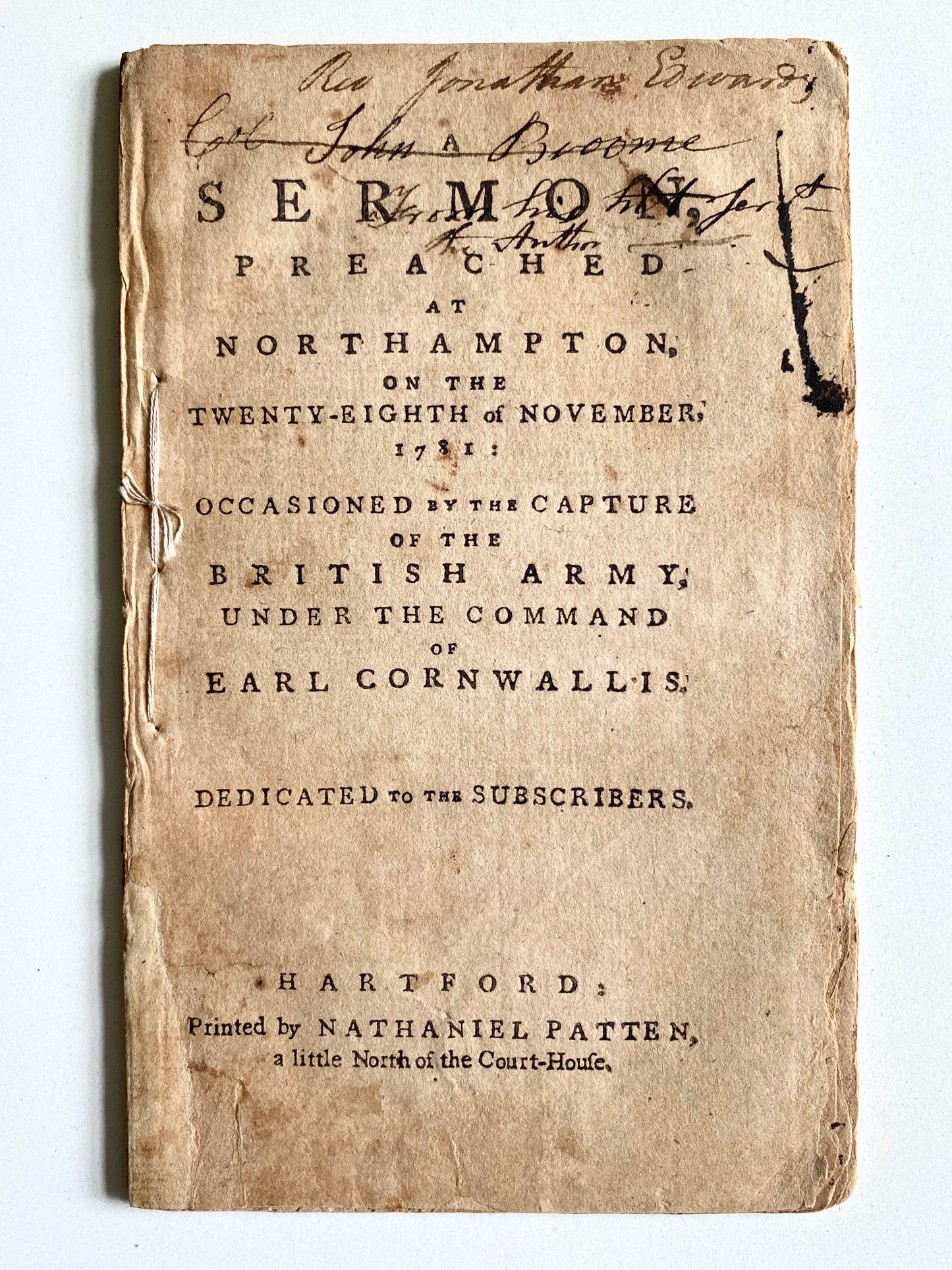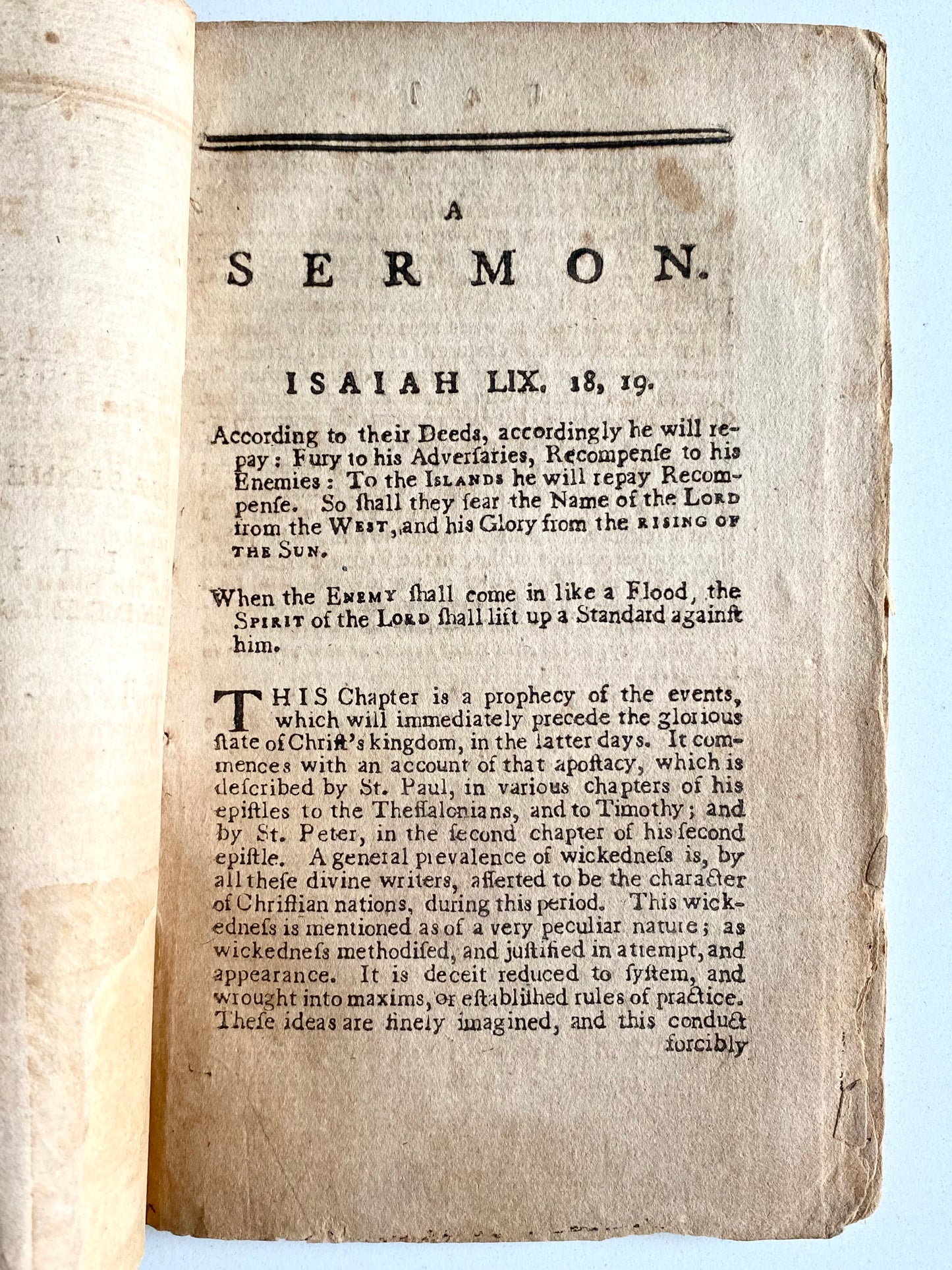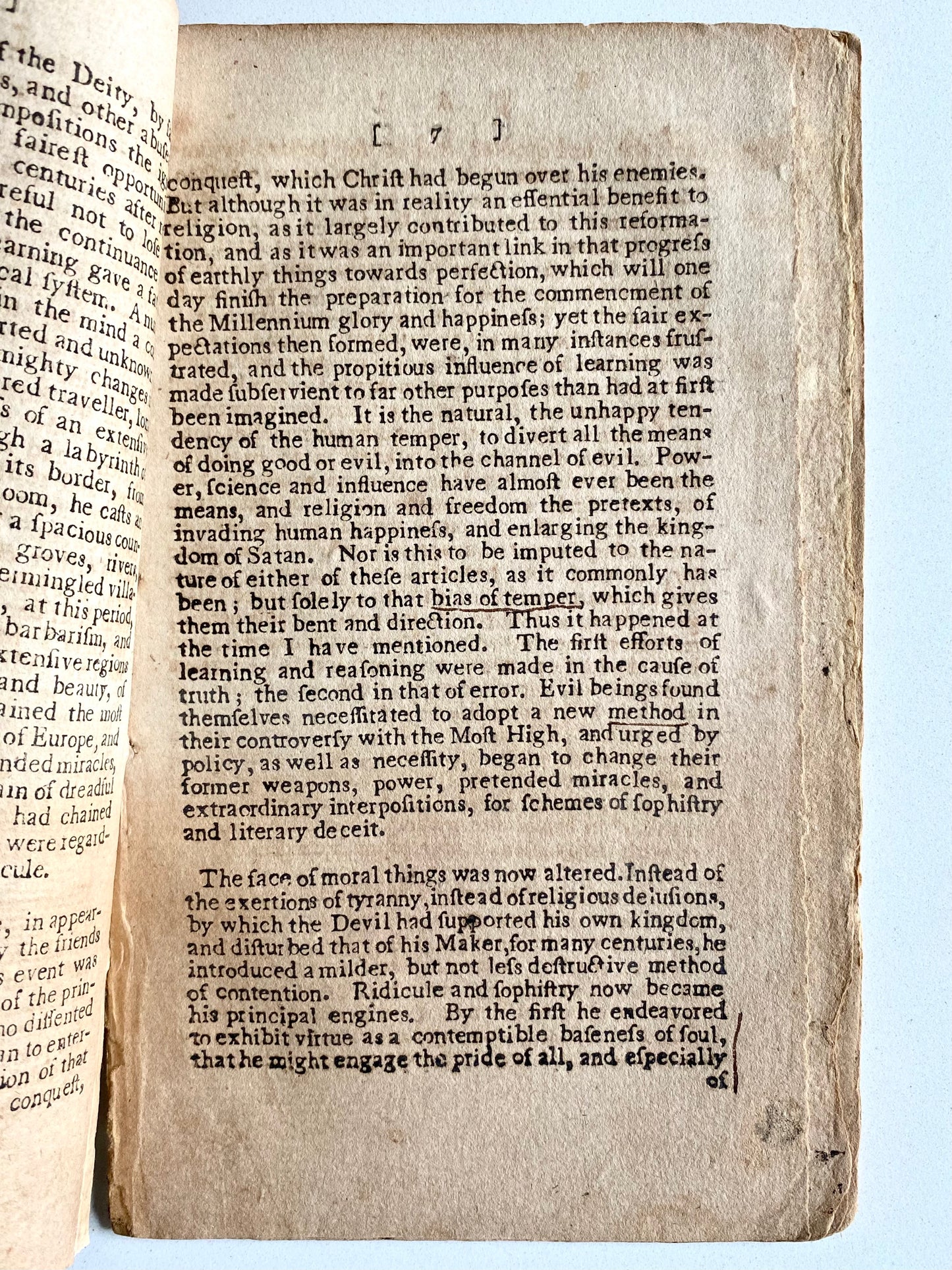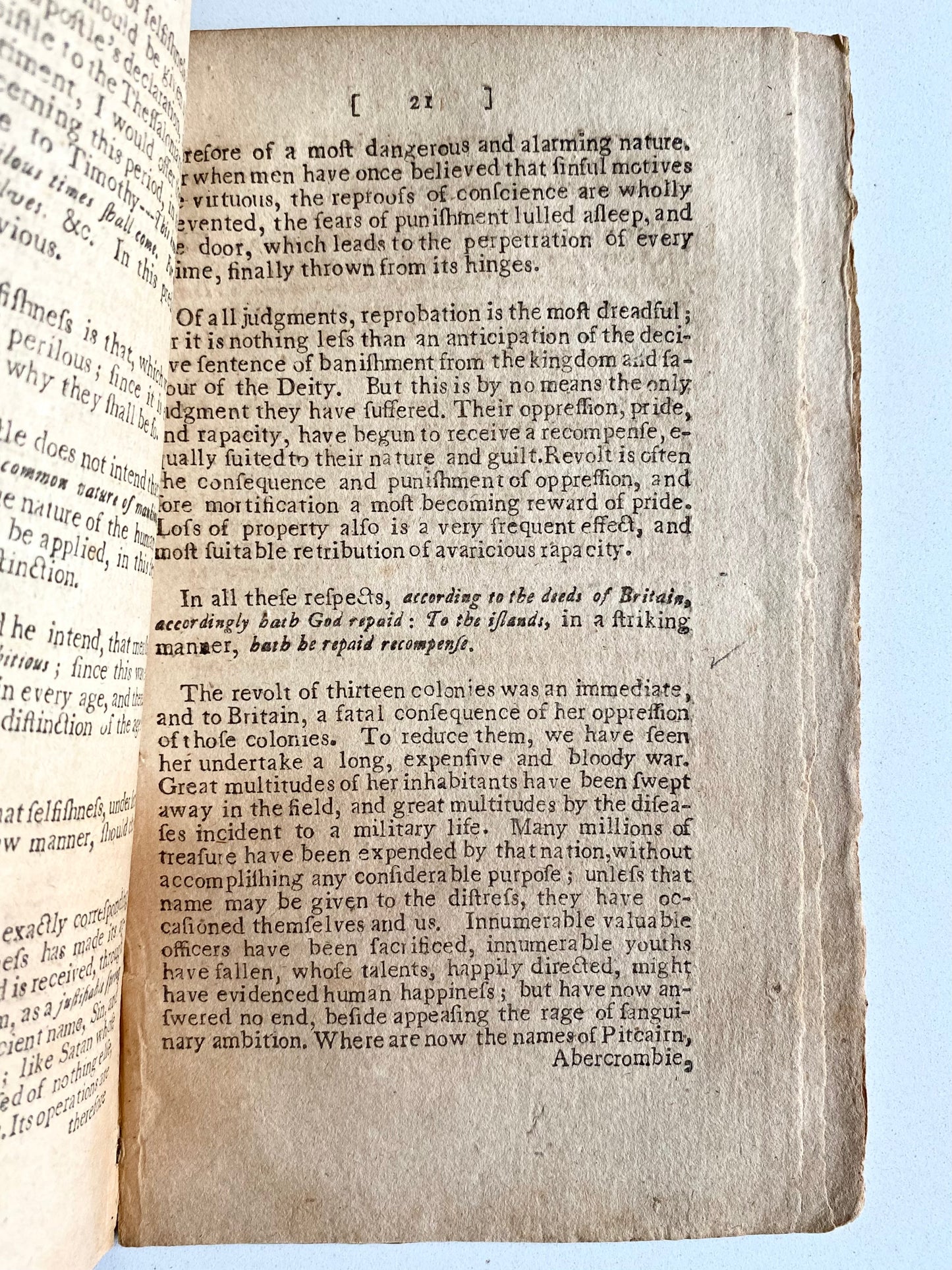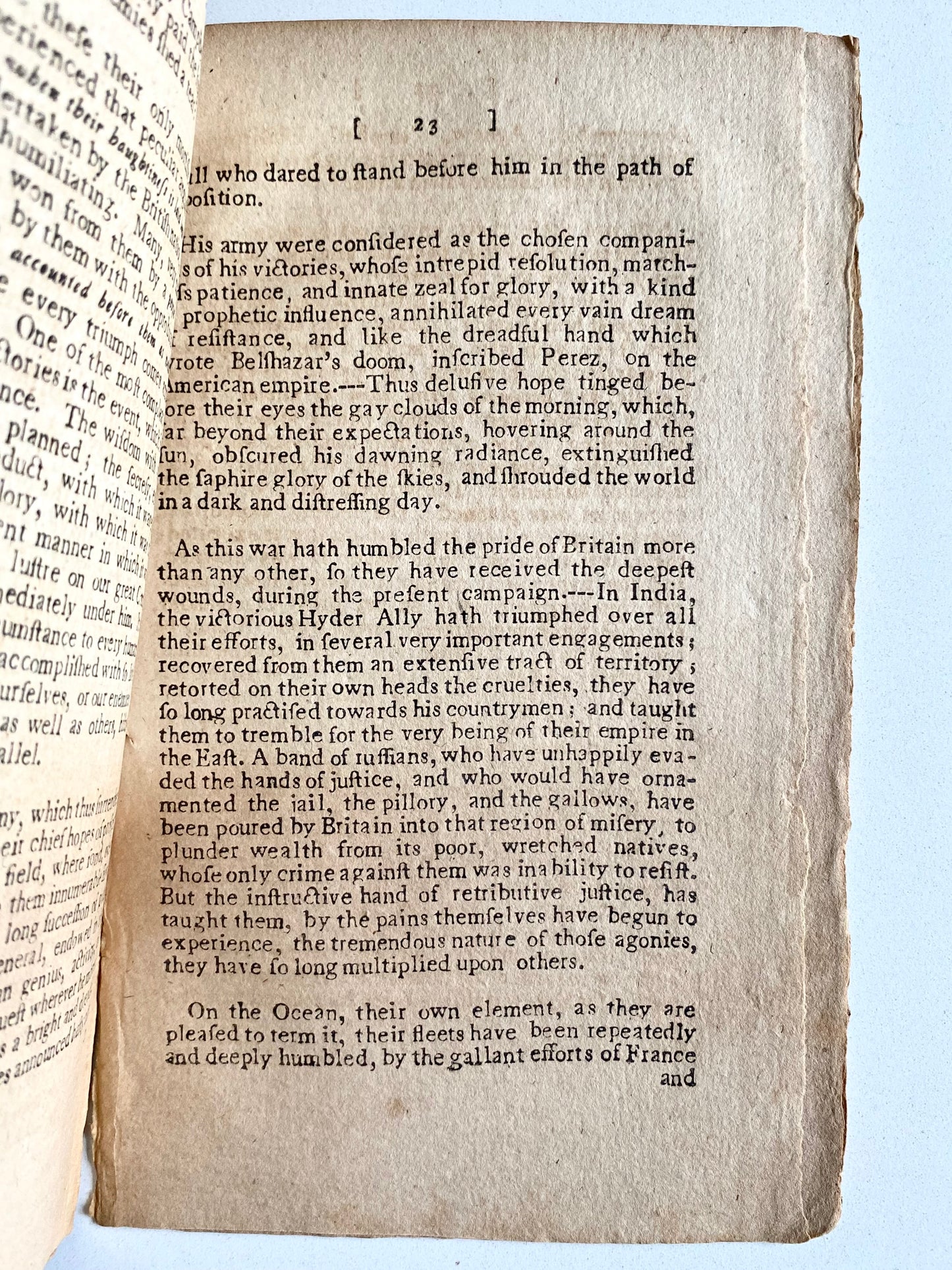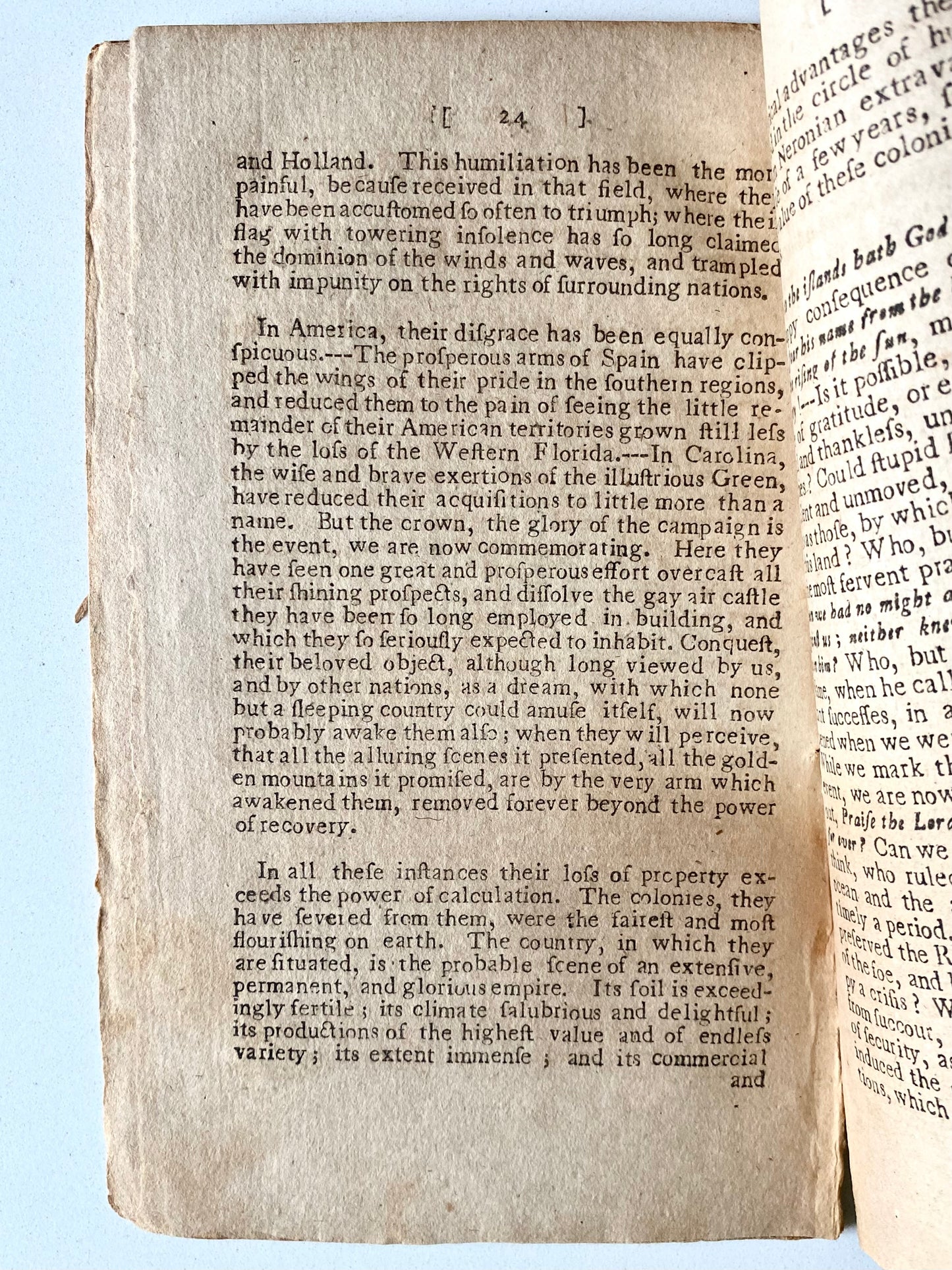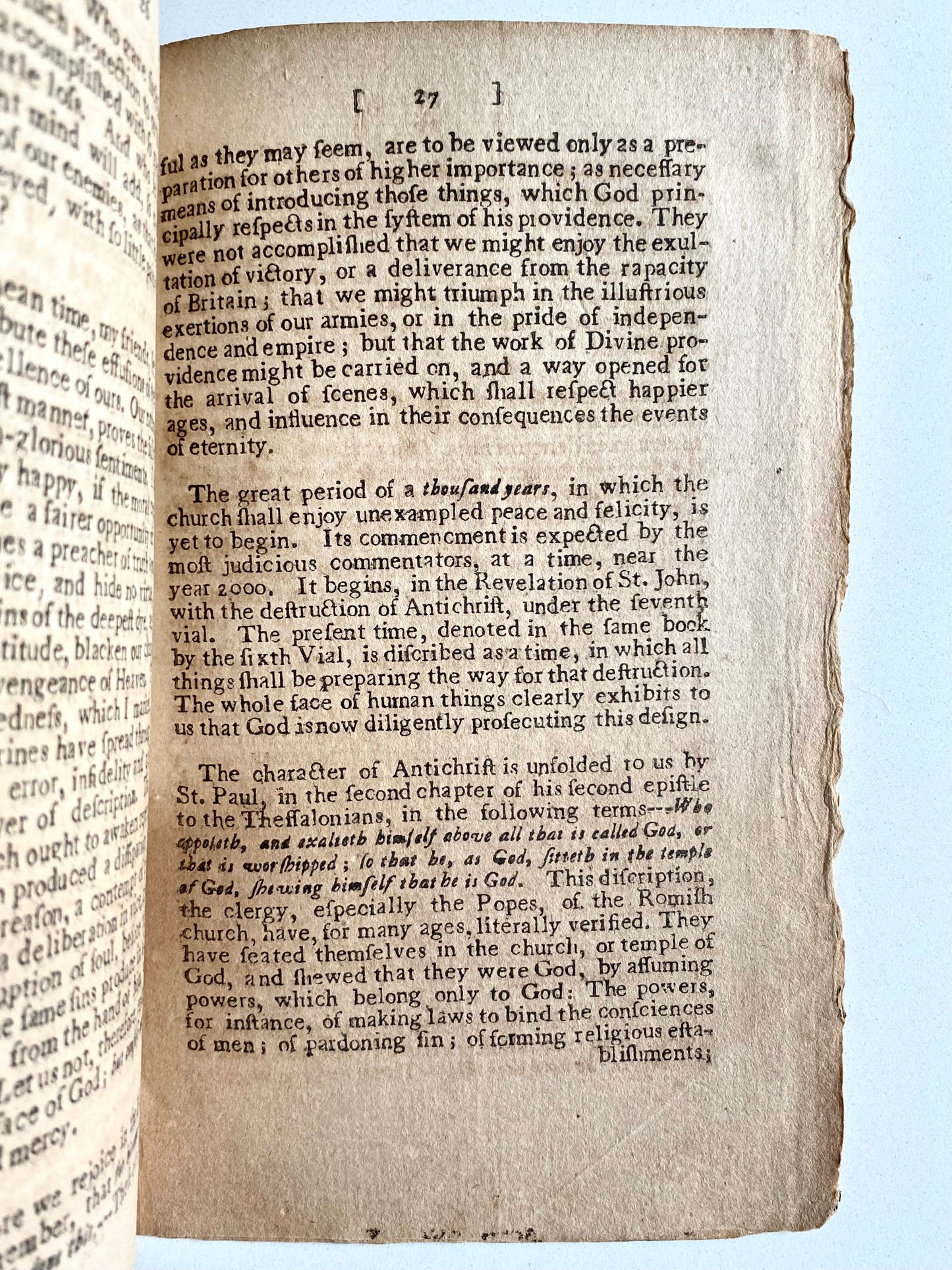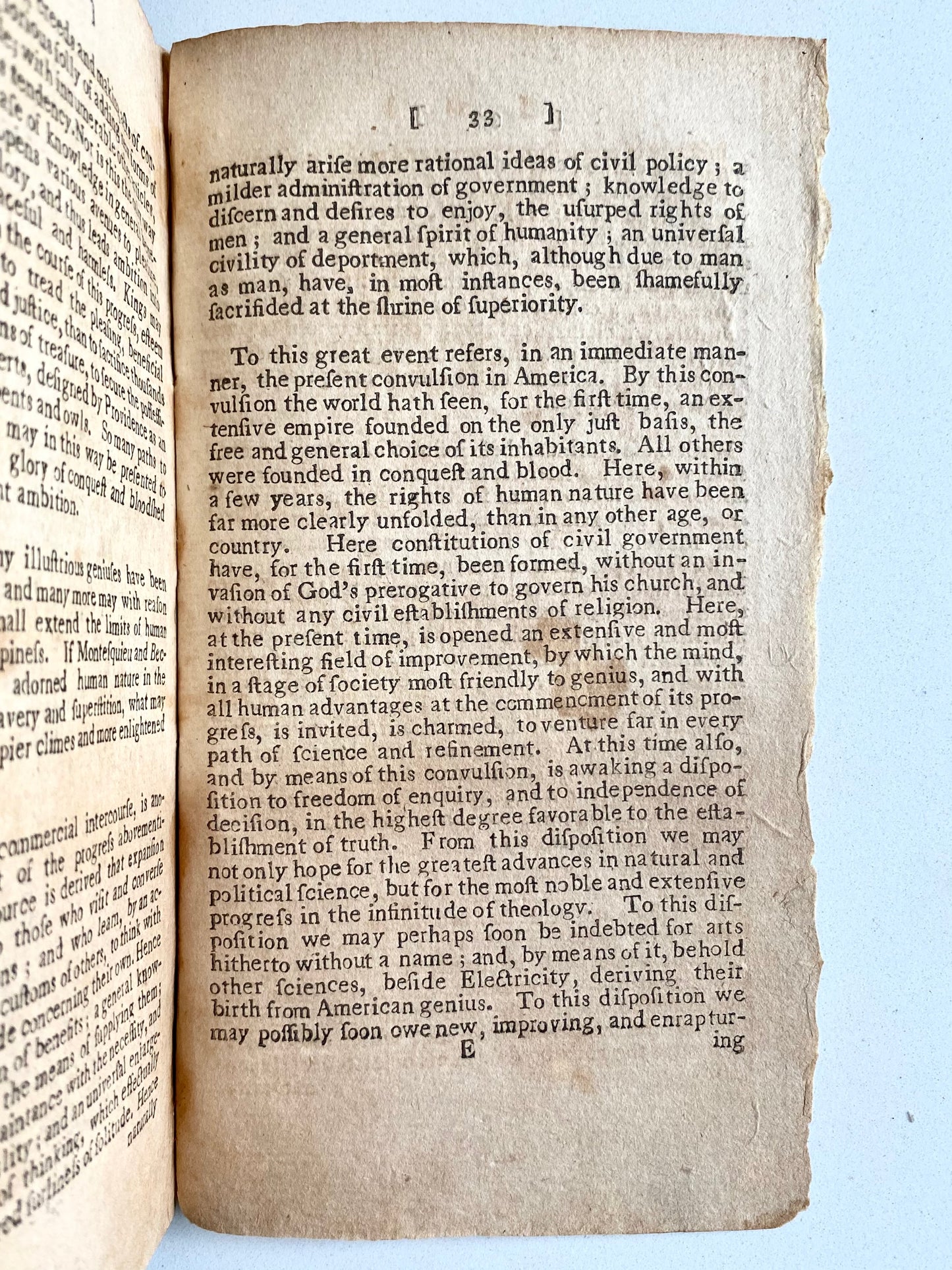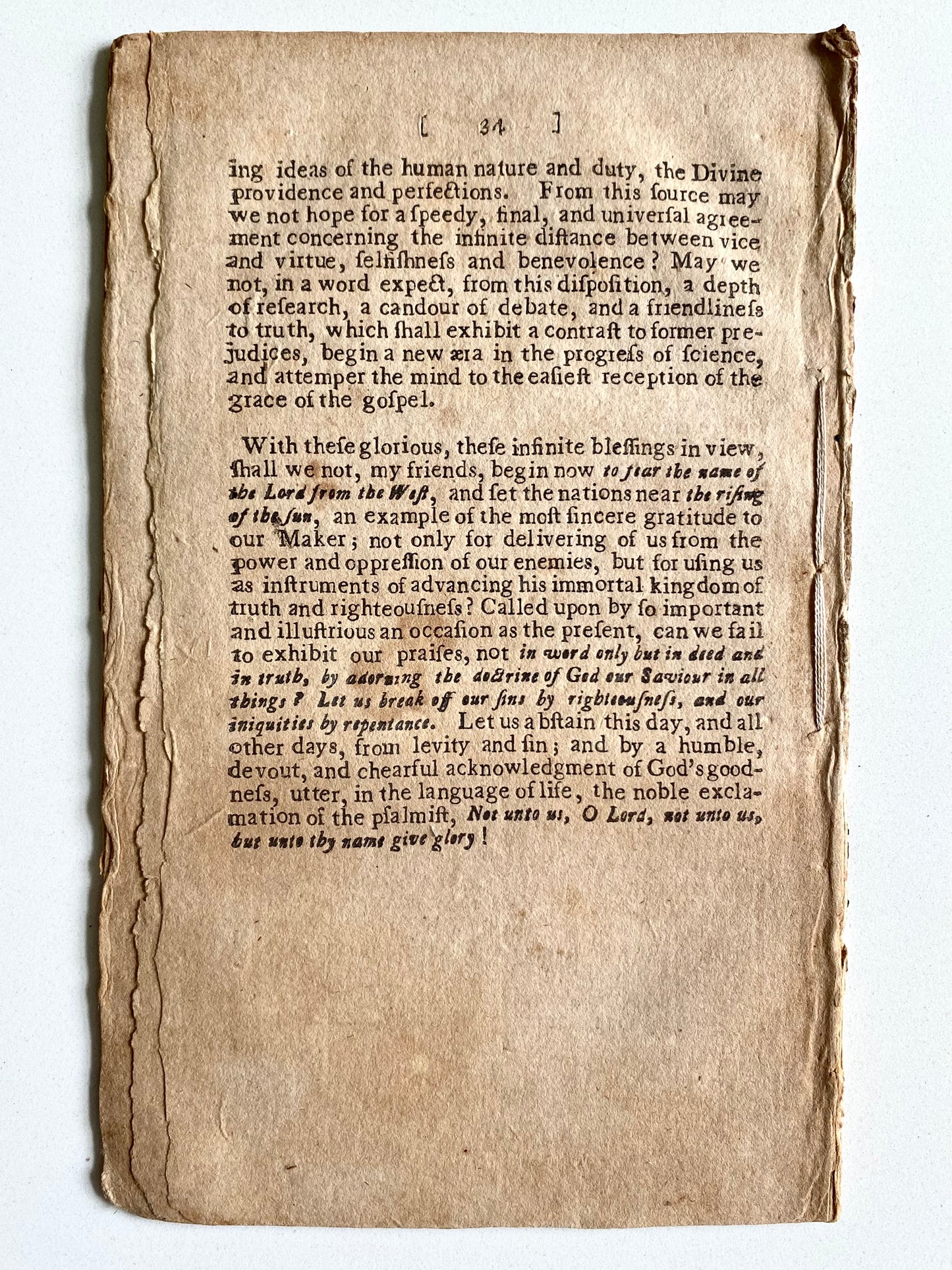Specs Fine Books
1781 TIMOTHY DWIGHT. Important Sermon on Separation of Church and State during American Revolution.
1781 TIMOTHY DWIGHT. Important Sermon on Separation of Church and State during American Revolution.
Couldn't load pickup availability
A wonderful first printed edition of one of the most important sermons preached during the American Revolutionary War. Preached on the heels of the decisive victory of General George Washington over Cornwallis, and with American victory all but eminent, Dwight articulates the true nature of the Battle for America in both religious and political terms.
He chooses for his text Isaiah 59.18, and 19, which he believes to speak of the 1000-year reign of Christ, or the Millennium. He uses this idea to hinge it together with the Millennium of the Book of Revelation.
What is at stake in the American Revolutionary war? The coming Millennium. In order for it to arrive, ecclesiastical and political power need to be separated from each other once and for all. Political power cannot use religious power to fulfill its objectives; it leads to persecution, bigotry, and tyranny. And Christianity cannot use political power to accomplish its aims; it corrupts and makes the Kingdom of God the Kingdom of humanity. The idea then makes the Separation of Church and State an eschatological urgency.
A fascinating articulation of the importance of America in God's program of bringing in world peace, the millennium, the Kingdom of God, by giving political power to the people, and keeping the community of faith pure by untethering it from political power. Fantastic.
Additionally, this example has historically significant provenance, being presented by Timothy Dwight to Colonel John Broome [1738-1810]. He enlisted in 1775 and was initially Lieutenant Colonel of the Second New York City Regiment of the Militia under John Jay. He was also a member of the New York Provincial Congress [1775-1777] and a delegate to the New York State Constitutional Convention [1777].
It was from thence gifted to Jonathan Edwards the Younger, son of Jonathan Edwards of Great Awakening fam, and uncle to Timothy Dwight [Edwards the Elder was his grandfather].
Only offered at auction once since 1941. Very scarce and desirable.
Dwight, Timothy. A Sermon Preached at Northampton, on the Twenty-Eighth of November, 1781: Occasioned by the Capture of the British Army, Under the Command of Earl Cornwallis. Dedicated to the Subscribers. Hartford. Printed by Nathaniel Patten, a little North of the Court-House. 1781. 34pp.
Original side-stitched complete text, title through p.34. Untrimmed at foredge. Small expert repair at inner margin of title not touching text. Textually very good with a few very minor contemporary sepia ink notes.
EXTRACTS:
The revolt of thirteen colonies was an immediate, and to Britain, a fatal consequence of her oppression of those colonies. To reduce them, we have seen her undertake a long, expensive, and bloody war. Great multitudes of her inhabitants have been swept away in the field, and great multitudes, by the diseases incident to a military life. Many millions of treasure have been expended by that nation, without accomplishing any considerable purpose; unless that name may be given to the distress they have occasioned themselves and us. Innumerable valuable officers have been sacrificed, innumerable youths have fallen, whose talents, happily directed, might have evidenced human happiness; but have now answered no end, beside appeasing the rage of sanguinary ambition. Where are now the names of Pitcair, Abercrombie, Agnew, Campbell, Phillips, and Andre; to whom glory paid the highest tribute, and for whose fate enemies shed a tear?
Nor are these their only mortifications. They have experienced that peculiar anguish, which the proud feel, when their haughtiness is laid low. - - - Of all the wars, undertaken by the British nation, perhaps this is the most humiliating. Many, very many victories have been won from them by a people of yesterday, stigmatized, by them with the opprobrious epithet of Rebels, and accounted before them as nothing. From such a people every triumph comes armed with a double sting. One of the most compleat and glorious of these victories is the event which hath assembled this audience. The wisdom with which this enterprize was planned; the secresy; expedition, courage and conduct, with which it was crowned; and the benevolent manner in which it was used; cast the brightest lustre on our great Commander, and the army under him. It must be a most pleasing circumstance to every humane mind, that this event was accomplished with so little loss of blood, either to ourselves, of our enemies. Perhaps, in this respect, as well as others, history can scarcely furnish its parallel.
On the general and army, which thus surrendered to us, our enemies placed their chief hopes of prosperity. They had entered upon a field, where fond, over-fancy painted before them innumerable flowery scenes of pleasure, and a long succession of golden days of triumph. Their general, endowed in their imaginations with Caesarean genius, activity, and perseverance, ensured conquest wherever he moved, and was regarded by them as a bright and dreadful meteor, whose terrible glories announced hasty ruin to all who dared to stand before him in the path of opposition.
His army were considered as the chosen companions of his victories, whose intrepid resolution matchless patience, and innate zeal for glory, with a kind of prophetic influence, annihilated every vain dream of resistance, and like the dreadful hand which wrote Belshazar's doom, inscribe Perez, on the American empire. Thus delusive hope tinged before their eyes the gay clouds of the morning, which, far beyond their expectations, hovering around the sun, obscured his dawning radiance, extinguished the saphire glory of the skies, and shrouded the world in a dark distressing day.
As this war hath humbled the pride of Britain more than any other, so they have received the deepest wounds, during the present campaign.
. . .
Can we fail to think or to adore, while we think, who ruled, with so benignant a hand, the ocean and the air, that wafted to our coasts, at so timely a period, the fleet of our illustrious ally? Who preserved the Rhode-Island squadron form the hands of the foe, and bade them join their friends at so happy a crisis? Who led our enemies to such a distance from succour, and prompted them to us for a prey? Who induced the officers and soldiers of the different nations, which composed our army, like brothers, to dwell together in unity? Who gave such success to our operations, and such protection to our soldiers, as that the end was accomplished with so great expedition, and with so little loss. And who, let me add, as every benevolent mind will add, so mercifully preserved the lives of our enemies, as that so glorious a triumph was achieved, with so little pain to the feelings of a Christian?
. . .
The great period of a thousand years, in which the church shall enjoy unexampled peace and felicity, is yet to begin. Its commencement is expected by the most judicious commentators, at a time, near the year 2000. It begins, in the Revelation of St. John, with the destruction of Antichrist, under the seventh vial. The present time, denoted in the same book by the sixth Vial, is described as a time, in which all things shall be preparing the way for that destruction. The whole face of human things clearly exhibits to us that God is not diligently prosecuting this design.
. . .
This scheme [the joining of civil and ecclesiastical powers] hath formed the most fatal opposition ever made to the kingdom of Christ. To accomplish its destruction, and make an entire separation between civil and ecclesiastical things, is the great business of Providence, during the continuance of the sixth vial.
. . .
. . . [Sceptics] . . . have also, with great success, attacked that blind, selfish attachment to false opinions, termed bigotry. This, like all other branches of selfishness, hath, in all its designs, been a most bitter enemy to the truth. But it is the glorious attribute of the Most High to bring good out of evil, and to induce selfishness to those actions, which fulfil the wishes of a nobler principle. Thus, in the instance before us, as bigotry is the parent of persecution to the sceptics, as well as others, they have been led, merely by motives of self-defence, to attempt its overthrow. This attempt hath been in a considerable measure successful; and the sceptics have thus accidentally, or in better language, providentially become the instruments of building up that kingdom, which they designed to destroy. For it is to be remembered as a most important truth, that each of the above mentioned articles, religious bigotry, civil establishments of religion, and restriction of moral enquiry, is a much more destructive enemy to the religion of the Bible, than open infidelity.
. . .
To this great event refers, in an immediate manner, the present convulsion in America. By this convulsion the world hath seen, for the first time, an extensive empire founded on the only just basis, the free and general choice of its inhabitants. All others were founded in conquest and blood. Here, within a few years, the rights of human nature have been far more clearly unfolded, than in any other age, or country. Here constitutions of civil government have, for the first time, been formed, without an invasion of God's prerogative to govern his church, and without any civil establishments of religion. Here, at the present time, is opened an extensive and most interesting field of improvement, by which the mind, in a stage of society most friendly to genius, and with all human advantages at the commencement of its progress, is invited, is charmed, to venture far in every path of science and refinement. At this time also, and by means of this convulsion, is awakening a disposition to freedom of enquiry, and to independence of decision, in the highest degree favorable to the establishment of truth. From this disposition we may not only hope for the greatest advances in nature and political science, but for the most noble and extensive progress in the infinitude of theology. To this disposition we may perhaps soon be indebted for arts hitherto without a name; and, by means of it, behold other sciences, beside Electricity, deriving their birth from American genius. To this disposition we may possibly soon owe new, improving, and enrapturing ideas of the human nature and duty, the Divine providence and perfections. From this source may we not hope for a speedy, final, and universal agreement concerning the infinite distance between vice and virtue, selfishness and benevolence? May we not, in a word expect, from this disposition, a depth of research, a candour of debate, and a friendliness to truth, which shall exhibit a contrast to former prejudices, begin a new era in the progress of science, and attemper the mind to the easiest reception of the grace of the gospel.
Share
